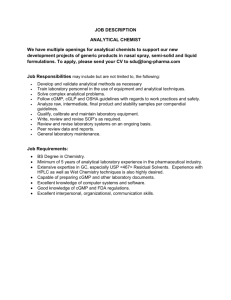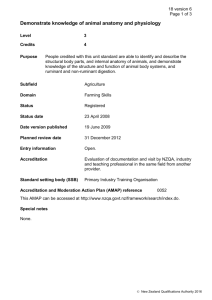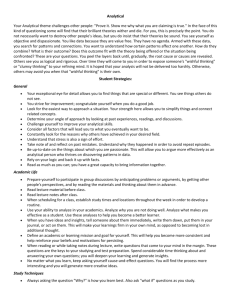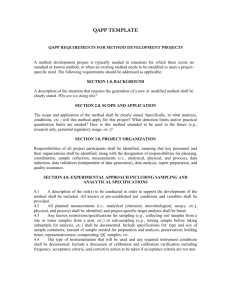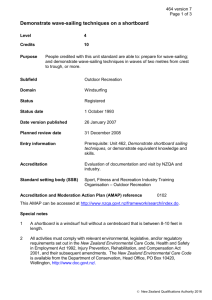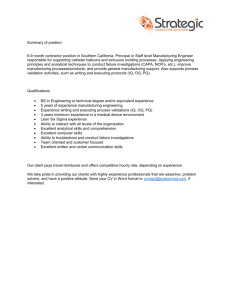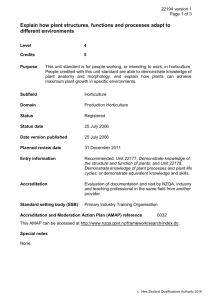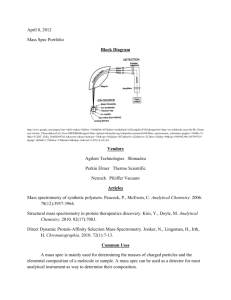19235 Maintain and manage specialist analytical equipment
advertisement
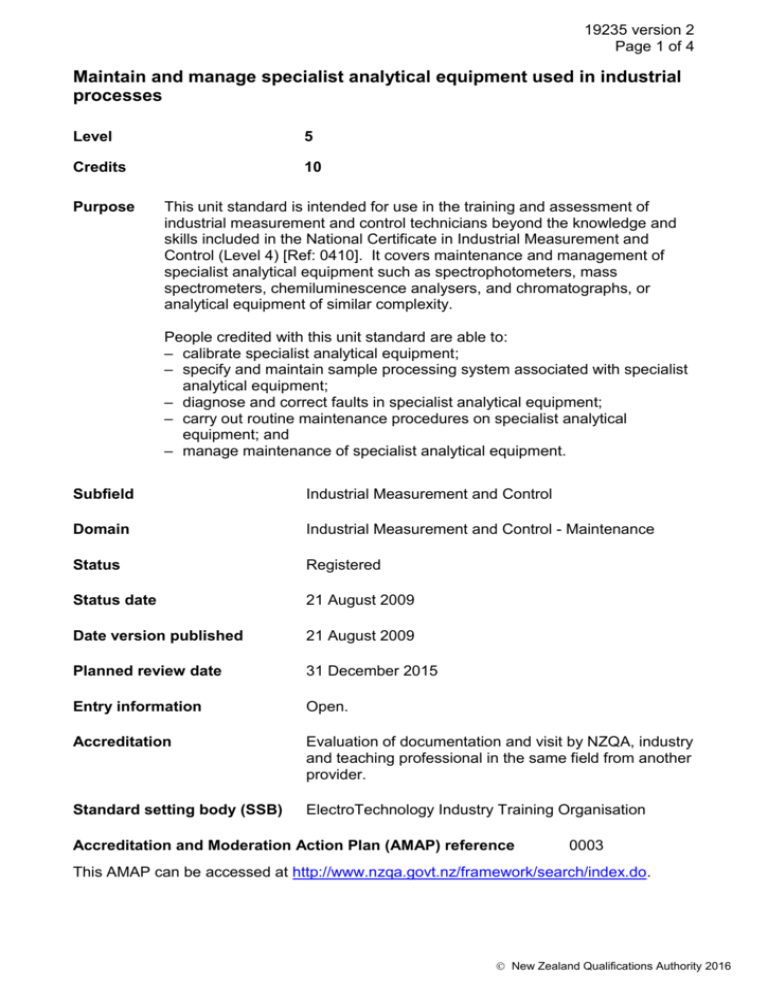
19235 version 2 Page 1 of 4 Maintain and manage specialist analytical equipment used in industrial processes Level 5 Credits 10 Purpose This unit standard is intended for use in the training and assessment of industrial measurement and control technicians beyond the knowledge and skills included in the National Certificate in Industrial Measurement and Control (Level 4) [Ref: 0410]. It covers maintenance and management of specialist analytical equipment such as spectrophotometers, mass spectrometers, chemiluminescence analysers, and chromatographs, or analytical equipment of similar complexity. People credited with this unit standard are able to: – calibrate specialist analytical equipment; – specify and maintain sample processing system associated with specialist analytical equipment; – diagnose and correct faults in specialist analytical equipment; – carry out routine maintenance procedures on specialist analytical equipment; and – manage maintenance of specialist analytical equipment. Subfield Industrial Measurement and Control Domain Industrial Measurement and Control - Maintenance Status Registered Status date 21 August 2009 Date version published 21 August 2009 Planned review date 31 December 2015 Entry information Open. Accreditation Evaluation of documentation and visit by NZQA, industry and teaching professional in the same field from another provider. Standard setting body (SSB) ElectroTechnology Industry Training Organisation Accreditation and Moderation Action Plan (AMAP) reference 0003 This AMAP can be accessed at http://www.nzqa.govt.nz/framework/search/index.do. New Zealand Qualifications Authority 2016 19235 version 2 Page 2 of 4 Special notes 1 This unit standard has been designed for learning and assessment on-job. 2 Range a Evidence of one type of specialist analytical equipment, including associated sampling systems, is required from – spectrophotometer, mass spectrometer, chemiluminescence analyser, chromatograph, or analytical equipment of similar complexity. b All activities must comply with policies, procedures, and requirements of the organisations involved; the ethical codes and standards of relevant professional bodies; and all relevant legislative and/or regulatory requirements. Elements and performance criteria Element 1 Calibrate specialist analytical equipment. Performance criteria 1.1 Calibration standards are maintained according to industry standards and specifications. 1.2 Test equipment is selected according to calibration instructions. 1.3 Personal and plant safety precautions are applied according to calibration instructions and site procedures. 1.4 Equipment is calibrated according to calibration instructions and site procedures. 1.5 As-left calibration accuracy is calculated according to calibration instructions and site procedures. 1.6 Test results are reported according to site procedures. Element 2 Specify and maintain sample processing system associated with specialist analytical equipment. Range typical sample processing systems may include some or all of – sample probe, sample extraction pump, filters, sample coolers, pressure regulation, exhaust processing. Performance criteria 2.1 Requirements for sample processing are specified in accordance with process requirements and standards relevant to the quantities being measured. New Zealand Qualifications Authority 2016 19235 version 2 Page 3 of 4 2.2 Routine maintenance checks on sample processing system are carried out in accordance with site procedures. Element 3 Diagnose and correct faults in specialist analytical equipment. Performance criteria 3.1 The diagnosis makes use of manufacturers’ troubleshooting guides. 3.2 Faults are identified and corrected to restore the system to operational condition. Element 4 Carry out routine maintenance procedures on specialist analytical equipment. Performance criteria 4.1 Routine checks and adjustments are carried out according to manufacturers’ specifications and site procedures. 4.2 Routine tests on performance are carried out according to manufacturers’ specifications and site procedures. Element 5 Manage maintenance of specialist analytical equipment. Performance criteria 5.1 Procedures for the maintenance of the analytical equipment and associated sampling systems are in place and up to date. This may include writing the procedures where none exist, or confirmation of effectiveness and updating in other situations. 5.2 Awareness of other maintenance personnel with regard to their part in the maintenance and associated safety procedures is confirmed, and appropriate instruction provided where necessary. 5.3 Supply of spare parts and consumables is managed according to operational requirements. Please note Providers must be accredited by NZQA, or an inter-institutional body with delegated authority for quality assurance, before they can report credits from assessment against unit standards or deliver courses of study leading to that assessment. New Zealand Qualifications Authority 2016 19235 version 2 Page 4 of 4 Industry Training Organisations must be accredited by NZQA before they can register credits from assessment against unit standards. Accredited providers and Industry Training Organisations assessing against unit standards must engage with the moderation system that applies to those standards. Accreditation requirements and an outline of the moderation system that applies to this standard are outlined in the Accreditation and Moderation Action Plan (AMAP). The AMAP also includes useful information about special requirements for organisations wishing to develop education and training programmes, such as minimum qualifications for tutors and assessors, and special resource requirements. Comments on this unit standard Please contact the ElectroTechnology Industry Training Organisation reviewcomments@etito.co.nz if you wish to suggest changes to the content of this unit standard. New Zealand Qualifications Authority 2016

